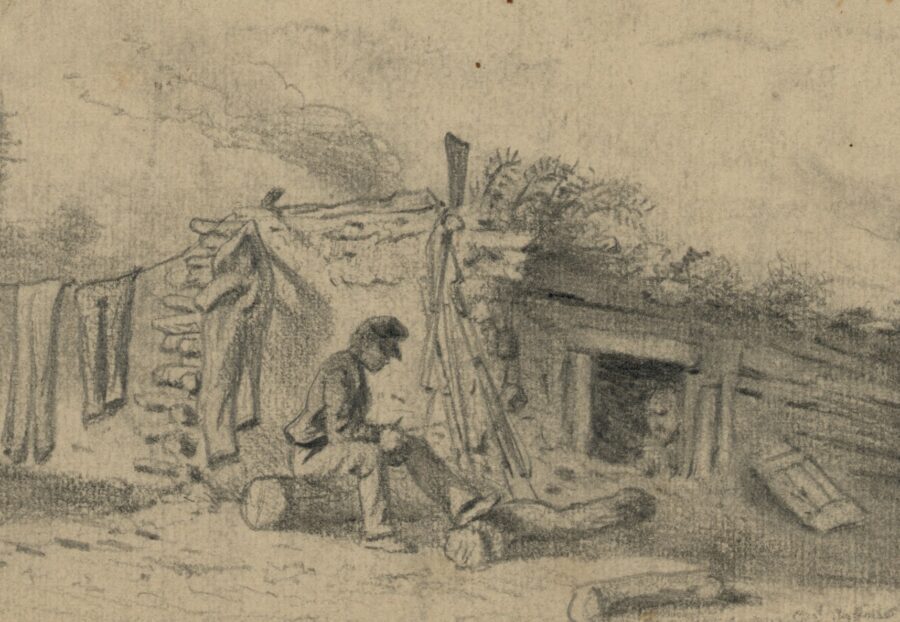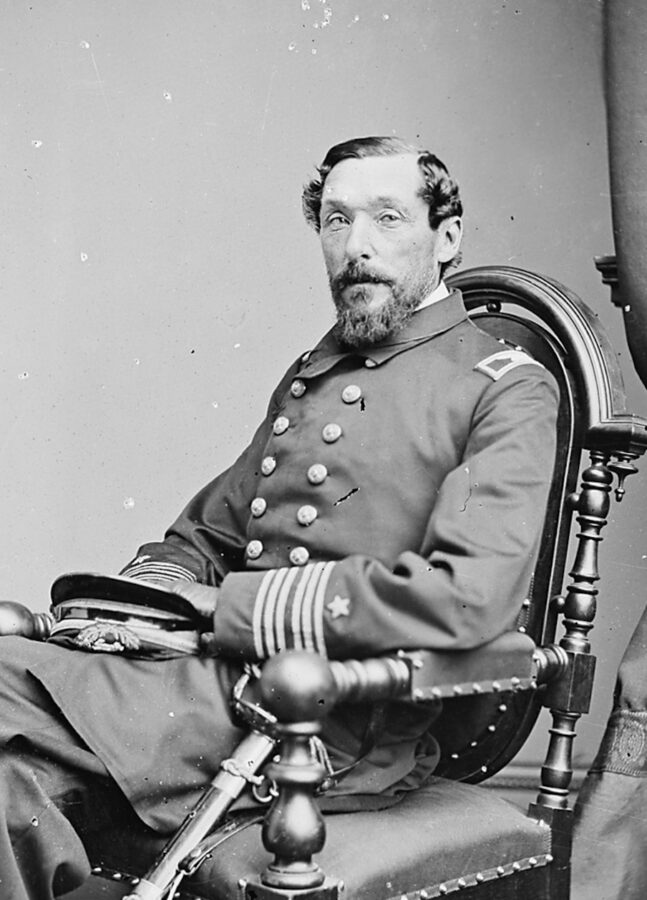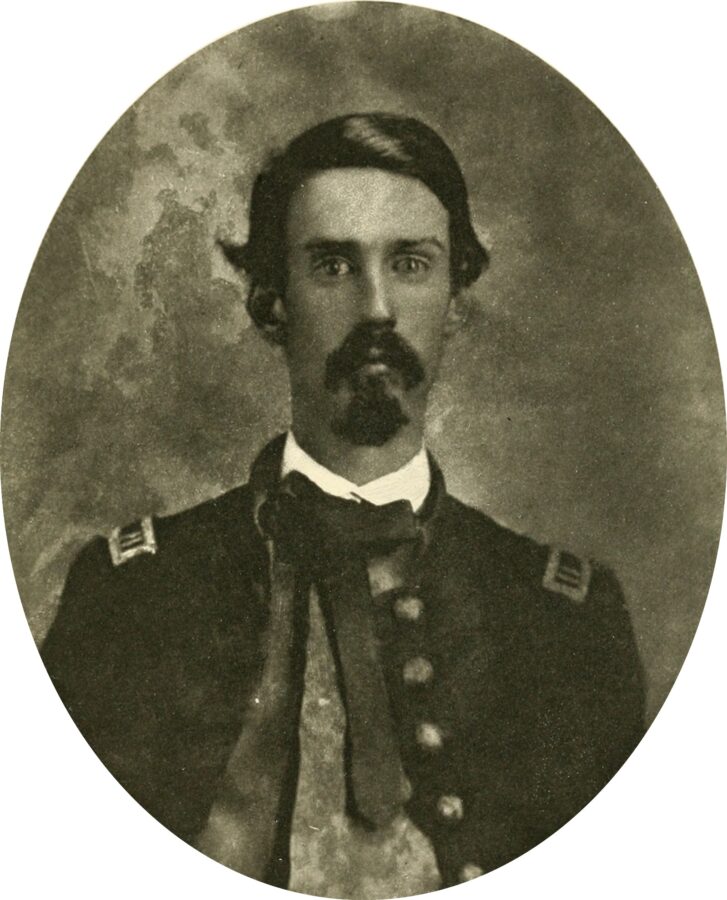
(Library of Congress)
In the Voices section of our Fall 2023 issue we highlighted quotes by Union and Confederate soldiers about the long stretches of inactivity and boredom they regularly faced. Unfortunately, we didn’t have room to include all that we found. Below are those that just missed the cut.
“We relieved the tedium of our confinement by manufacturing every conceivable kind of trinket of stone, wood, or any other material we could get that our few tools would work. I saw a violin made there that was a work of art.”
—Ralph J. Smith, 2nd Texas Infantry, on the time he spent at a Union prison in Alton, Illinois, in his memoirs
“Nothing on earth is going on here to relieve the tedium.”
—Union general Benjamin F. Butler, in a letter to his wife from his headquarters in the field during the Siege of Petersburg, September 13, 1864

Percival Drayton (National Archives)
“That no one is considered in carrying out these objects you will understand when I tell you, that several of the vessels have not been into a port from as far back as September and October last, and will not perhaps for as much longer, unless the boilers give out. You can imagine the tedium and hardship of such a life, passed in a small vessel, which most of them are. Of course people at home do not see it in this light, and those are generally more severe in their strictures on persons who occasionally want relief for a time, from this life without a joy, in proportion to the little likelihood there is of their being called on for anything of the same character.”
—Union naval officer Percival Drayton, on life aboard a blockading vessel, in a letter to a friend from New Orleans, April 23, 1864
“We had become so tired of the dull monotony and sameness of soldier life in winter quarters that almost any hardship elsewhere would be welcomed as a relief. Besides this the men of our command thought that we were hardly doing our duty by remaining inactive while our brothers in arms were doing all the fighting.”
—Albert O’Connell Marshall, 33rd Illinois Infantry, on the time his newly formed regiment spent in camp in 1861, in his memoirs
“Sunday came and went as many a Sunday had. There was nothing unusual apparent, unless, perhaps, the dull and listless attitudes of the men, and the monotonous call of those on guard were more oppressive than usual.”
—Confederate soldier Carlton McCarthy, on the life in the Army of Northern Virginia in early April 1865, in his memoirs
“Life aboard ship is rather monotonous. The officers and crew, each and all, have their regular routine duty when at sea and when in port. At sea the deck officers and the engineers have their four hours on duty and eight hours off. While the crew have watch and watch, or four hours on and four hours off. Night and day, stormy or pleasant, hot or cold, it makes no difference, except in very severe storms, when all hands are on duty until it abates.”
—Union sailor William H. Badlam, on his service aboard USS Kearsarge, in his memoirs
“Parson Bunting preached for us to-day. Nothing occurred to change monotony of camp. Sick, and time drags slowly with me.”
—Texas soldier Ephraim Shelby Dodd, in his diary, April 22, 1863
“Monotony continues. It is indeed a dull life.”
—J.R. McMichael, 12th Georgia Infantry, in his diary for September 23, 1864, while a prisoner at Fort Delaware

William Thompson Lusk (War Letters of Willam Thompson Lusk)
“I have been bored to death with the ennui of city soldiering. To be sure we are fêted, and take our places among the Princes of Delaware, still … it was not for this I left home, and I cannot, with all the idle time on my hands, avoid regretting the pleasant summer plans we had arranged in old Conn[ecticut].… So I suppose I feel disappointed at being so peacefully employed at the seat of war.”
—Union staff officer William Thompson Lusk, on his time spent in Wilmington, Delaware, while awaiting a new assignment, in a letter to his mother, July 10, 1863
“You certainly should not complain of my neglect, in writing no more than once in ten days while we are quartered at such an intolerably stupid place as this, for there really have not been two incidents occurred worthy of notice, since we pitched our tents on this ground. Never since I first entered the service have I passed two months in which there seems so little worth remembering. Nothing but a dull round of picket, fatigue, and camp guard; no alarms and no enemy within a hundred or miles of us, save ‘citizen guerrillas,’ and they in no force sufficient to scare even a foraging party.”
—Charles W. Wills, 103rd Illinois Infantry, in a letter home from camp in Jackson, Tennessee, March 5, 1863
“If you really like to listen to the monotony of our eventless experience, I cannot do less than to write it for you.”
—Wilder Dwight, 2nd Massachusetts Infantry, in a letter home, July 31, 1861
“It is our regiment’s turn to watch at the front, so before daylight we moved up and took our position. We placed our muskets across the rifle pits, pointing towards the fort, and then lay down and ran our eyes over the gun, with finger on trigger, ready to fire at anything we might see moving. For hours not a movement was seen, till finally an old half-starved mule meandered too close to our lines, when off went a hundred or more muskets, and down fell the poor mule. This little incident, for a few minutes, broke the monotony.”
—Osborn H. Oldroyd, 20th Ohio Infantry, on an incident during the Siege of Vicksburg, in his diary, May 24, 1863
“We have now been several weeks in the city and the boys are beginning to tire of it. This every-day, humdrum life is getting irksome, and the boys are anxious for a change. Frequent changes and excitement are what keeps up the soldier’sspirits. In the dull routine and idleness of camp, they grow uneasy, homesick and despondent.”
—David L. Day, 25th Massachusetts Infantry, in his diary, April 25, 1862, during his regiment’s stay in New Bern, North Carolina
“I am in no mood for letter-writing. I write because there is a mail going. I shall not write again till I feel better. You need not feel concerned at not hearing from me. I almost feel as if I would not take up a pen again till I could speak of something else than the inglorious details of our present life. Love to all at home.”
—Wilder Dwight, 2nd Massachusetts Infantry, in a letter home, March 31, 1862
“Life in camp is generally dull with me, and I feel especially dull to-day. I have sometimes had a job … which kept me busy enough; but these only happen now and then, and but for them my life would be idle enough, I am sure. When here in camp it really seems that I have no way of employing myself. I sometimes think I would prefer a more active campaign, winter as it is.”
—Confederate general Elisha Franklin Paxton, in a letter to his wife, December 15, 1861
“Camp life is becoming terribly boring. We have scarcely the necessities of life let alone the luxuries.”
—Confederate soldier Green Berry Samuels, in a letter to his wife, November 1, 1862
